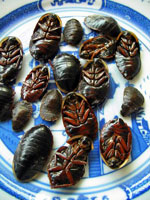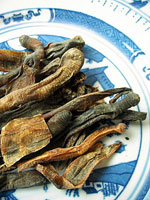According to Global Cancer Statistics 2002, there are 10.9 million new cases, 6.7 million deaths and 24.6 million persons alive with cancer (within three years of diagnosis) around the world. With improved detection and treatment methods, more and more people are now living with cancer. However, distressing complications such as emaciation, hair loss, bleeding and infection still affect patients. Traditional Chinese medicine (TCM) has a definite advantage in dealing with these.
In TCM history, tumors were discussed as early as 4,000 years ago on oracle bones. Malignant tumors were first recorded in the Song dynasty (AD 960-1279), which described them as masses that were rock-firm and had uneven surfaces. Over the centuries, TCM has accumulated much knowledge on how to treat cancer. For example, insect products such as earthworms, ground beetles, blister beetles and scorpions, or toxic ingredients like dried toad venom, nux vomica and cinnabar, are still used as the basis of present-day therapies. In China, although the traditional therapies are gradually being replaced by more modern methods, TCM's role in overall bodily enhancement and protection still remains a norm among cancer regimens.
 |
|
 |
| Ground beetles |
|
Earthworms |
From a TCM perspective, cancer is a systemic disorder and the uncontrolled growth of malignant cells is only part of the whole complex manifestations, individuals also have certain organ dysfunctions, meridian disorders and so on. TCM believes that cancer development is basically due to a weakened body that makes individuals susceptible to different carcinogens. When multiple factors repeatedly act on the body leading to internal disharmony and organ dysfunction, they cause an accumulation of pathological waste products, and these will then induce abnormal growth in certain places. Western allopathic approaches like surgery, radiation or chemotherapy mainly target cancer cells, with little concern about the overall condition of the body. Moreover, the approaches cause further damage to the body. In TCM words, they act powerfully on eliminating the "evils", but do serious damage to the "healthy energy"; as a result, the "habitat" that facilitates the growth of cancer cells still exists and this always brings a poor prognosis. Based on a holistic view of cancer pathology, TCM physicians are able to realize substantial changes in cancer patients through unique examination and diagnostic skills, and along with therapies like herbs, acupuncture, massage or diet that aim at assisting the body to regain balance and achieve homeostasis. TCM can benefit cancer patients significantly and become a useful complement during conventional treatment.
Generally, the approaches used in TCM are less aggressive; they are safe, effective, affordable and accessible to most cancer patients. They control symptoms, shorten recovery time, improve survival rates and quality of life. The main reasons why many people seek TCM treatment for cancer are:
|